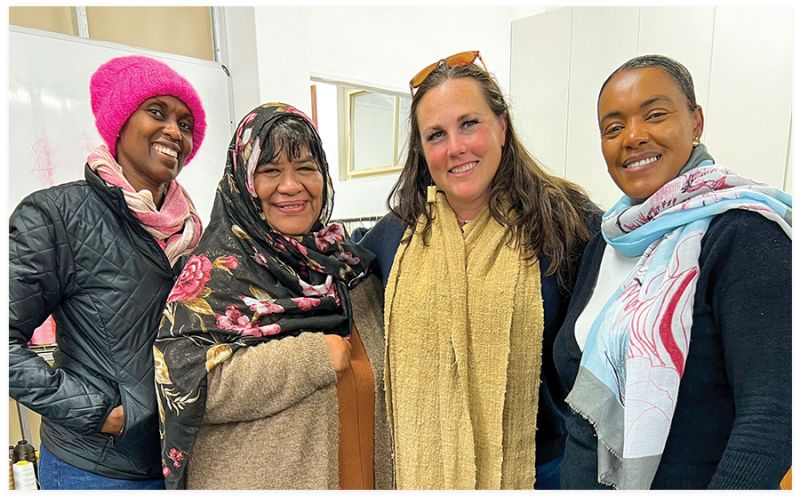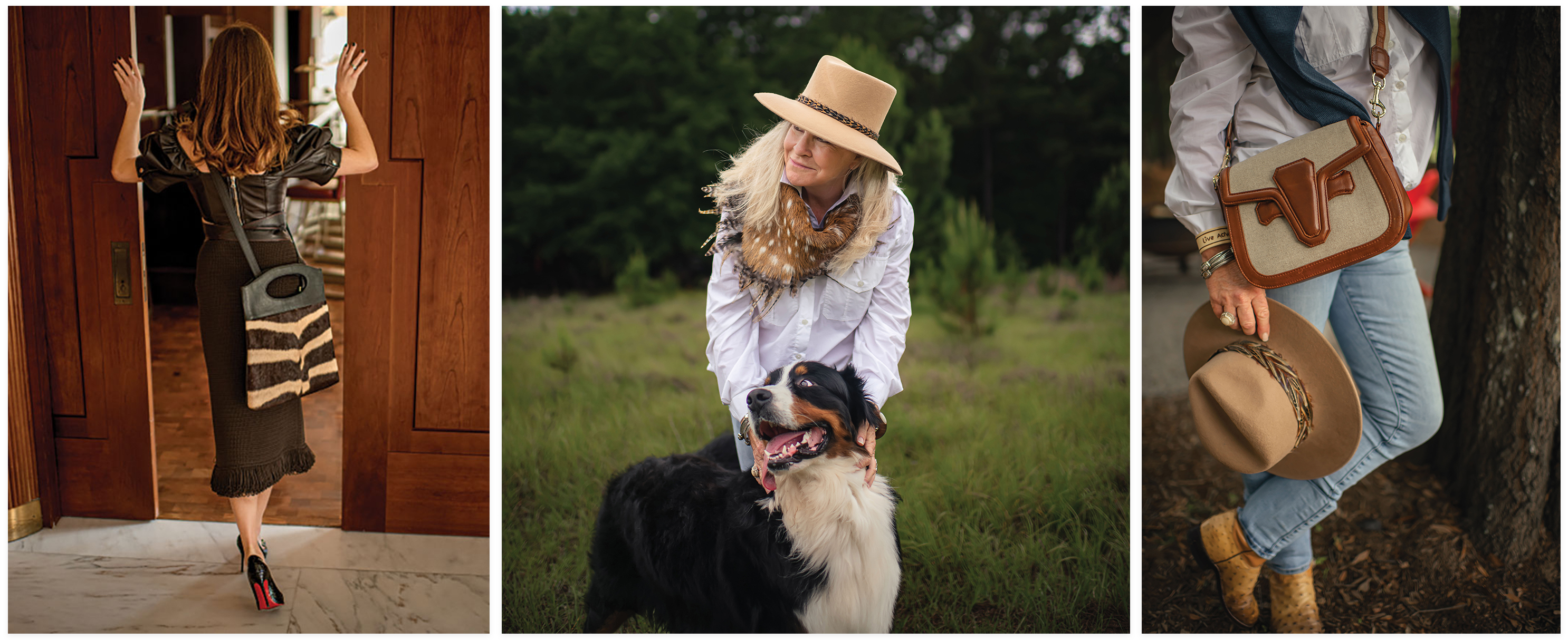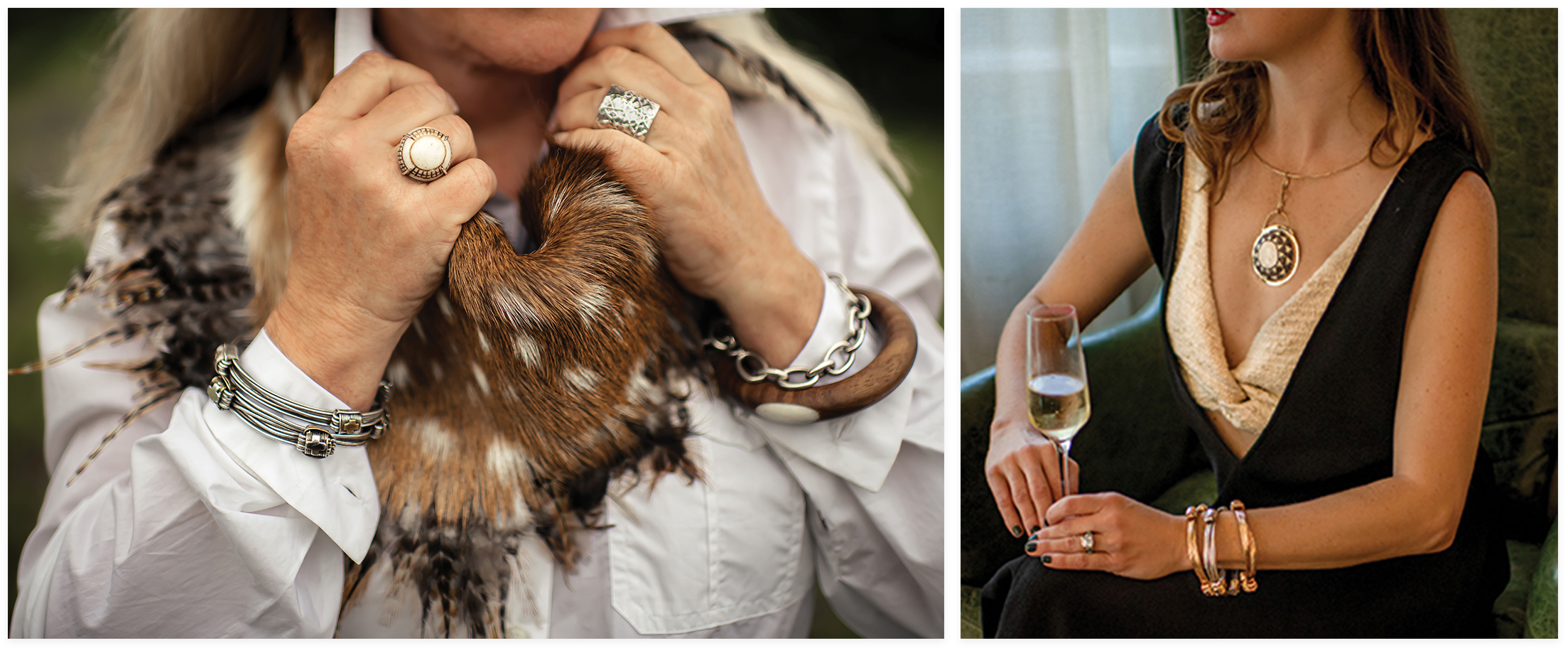Look for the business to launch its first housewares line this fall

Norton & Hodges team members Gaceri Kirimi (far left), founder Suzette Bussey (third from left), and Veronique Hendricks (far right) visit one of their partner artisans during a trip to South Africa earlier this year.
Suzette Bussey didn’t expect to find her professional calling while honeymooning on her husband’s uncle’s 20,000-acre farm in Namibia. But, she says, the moment she stepped off the plane in the African country, her life changed. “I smelled the air and felt at home,” she says. It wasn’t just the atmosphere that made an impact. Once a defunct cow farm, the property had been carefully tended, with much of its native wildlife—including Damara dik-dik and kudu antelope—restored. “I was struck by the sustainability of it all,” Bussey says. “From these beautiful animals, any meat we didn’t eat was sold in town. The skins were stored until we found something to do with them. Nothing was wasted.”
Back in Charleston, Bussey longed to share the ideas that had captivated her there—and put them into practice. So she started sketching. “I had no background as a designer,” she says of what was a passion project at the time. Using Burchell’s zebra and kudu hides from the farm, she found a leather worker in Birmingham, Alabama, who helped bring her first Norton & Hodges messenger bag to fruition. Bussey took the small collection to the Dallas Safari Club, where she was surprised again: they sold.

Norton & Hodges uses sustainibly sourced leathers and hides, such as by-products from livestock and off-cuts, to design luxury handbags, hats, and scarves.
As her line grew, encompassing handbags, jewelry, and other accessories, sustainable sourcing—as well as employing female artisans at every level—continued to be a priority. “You can have an incredible impact just by doing business the right way—getting to know people and understanding their lives,” she says. “That exchange is what allows us to really co-create something.”
On trips to Namibia, South Africa, and beyond, Bussey struck partnerships with regenerative farmers and traditional artisans, incorporating their elements into her head-turning pieces, including exotic leather handbags, fur scarves, and jewelry. “It was a good challenge, determining how we could share these generational skills with a Western market,” she says.
Twelve years in, Norton & Hodges continues to be committed to sustainable practices. “As much as possible, we try to cut out the middleman,” says Gaceri Kirimi, who manages operations in Africa. Sourcing bone beads for a recent collection, Kirimi noticed that her supplier described the product as “handmade in Kenya.” If the beads were handmade, she thought, why not go straight to the source? She chased countless leads until one led her to the Kenyan women themselves. “Now, when I put on this necklace, I know exactly where it came from,” Kirimi says. “I know what the artist is going through, how much I paid her, and that it was fair.”
Stateside, Norton & Hodges applies the same philosophy. This fall, the brand is partnering with local domestic abuse shelter My Sister’s House. Using leftover feathers from hunting clubs across the country, residents will help craft hatbands for the brand. “Working with natural materials can be a little like therapy for people who have experienced trauma,” Bussey says. “And for women coming from abuse situations, this will be a way to make some money.”

Norton & Hodges‘s signature silver or gold safari bracelets are inspired by traditional elephant hair bracelets and handmade by female artisans in South Africa.
Additionally, this fall brings the launch of Norton & Hodges’s first housewares line. “As always, the materials are what drive us,” she says of the baskets, barware, and furniture crafted from the brand’s existing components and by-products of the farm. “It’s all about using what we have.”
BY THE NUMBERS
■ 10: African countries Norton & Hodges has sourced from
■ 85: The percentage of the brand’s supply chain who are female artisans
■ 6: Years as a zero-waste operation
■ 12: Trips to Namibia